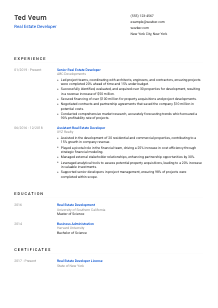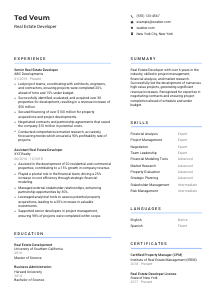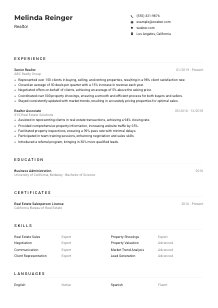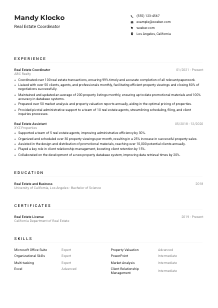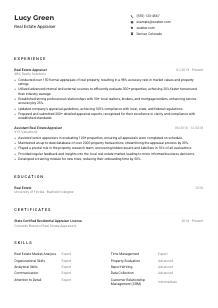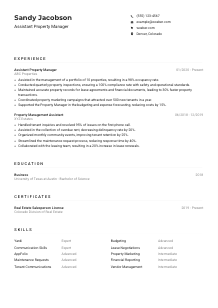Real Estate Developer CV Example
Building landscapes, but your CV feels foundation-less? Delve into this Real Estate Developer CV example, designed with Wozber free CV builder. See how adeptly you can blueprint your property prowess to align with job demands, ensuring your career skyline always reaches impressive heights!
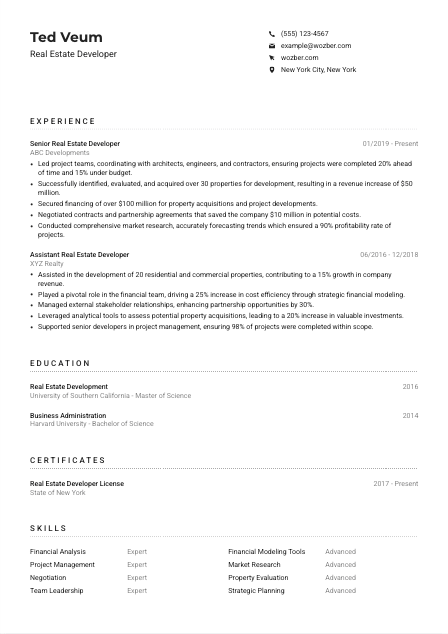
How to write a Real Estate Developer CV?
Aspiring to construct a future in real estate development? Your CV is the blueprint of your professional landscape, the cornerstone of your career edifice. Crafting an ATS-compliant CV tailored to a real estate developer's job description requires more than a sprinkle of industry keywords—it's about painting a vivid, compelling picture of your career journey. With Wozber's free CV builder, including ATS-friendly CV templates and a dedicated ATS CV scanner, let's navigate through the nuances of constructing a CV that's not only a door-opener but a conversation starter for your next big opportunity.
Personal Details
Your personal details are the scaffolding of your CV, the initial handshake with your prospective employer. Here, precision meets personalization, guiding the employer from a cursory glance to an intrigued engagement. Let's break ground by otimizing this section for a Real Estate Developer position, ensuring it's constructed with as much care as your future developments.
1. Showcase Your Identity
Engrave your name at the top in bold, drawing the eyes of hiring managers like a marquee. This isn't just another document—it's the narrative of your professional journey.
2. Align With Your Aspired Role
Directly below your name, state 'Real Estate Developer' as your professional title. It's like setting the cornerstone; it immediately signals your career direction and aspirations to the hiring manager.
3. Essential Contact Coordinates
Your phone and professional email address lay the pathways for communication. Ensure these are correct and professional. A misstep here could mean a missed opportunity.
4. Root Yourself in the Required Location
Including 'New York City, New York' in your CV aligns with the job's geographic prerequisites. It's about convenience and fit, echoing the job's call for locality or relocation readiness.
5. Digital Footprint
Consider appending a LinkedIn profile or personal portfolio site link. In today's digital age, it's akin to compiling a comprehensive dossier that goes beyond the CV.
Takeaway
These seemingly minor details are pivotal; they're the prologue to your professional narrative. Present them with the same precision you'd approach a property development project. Let them be precise, relevant, and inviting.





Experience
In the realm of real estate development, your experience serves as the bedrock. It demonstrates to hiring managers your capability to not just occupy space, but to enrich it profoundly. Let's excavate through examples and insights, cementing your experience in a manner that's compelling and distinctively tailored.
- Led project teams, coordinating with architects, engineers, and contractors, ensuring projects were completed 20% ahead of time and 15% under budget.
- Successfully identified, evaluated, and acquired over 30 properties for development, resulting in a revenue increase of $50 million.
- Secured financing of over $100 million for property acquisitions and project developments.
- Negotiated contracts and partnership agreements that saved the company $10 million in potential costs.
- Conducted comprehensive market research, accurately forecasting trends which ensured a 90% profitability rate of projects.
- Assisted in the development of 20 residential and commercial properties, contributing to a 15% growth in company revenue.
- Played a pivotal role in the financial team, driving a 25% increase in cost efficiency through strategic financial modeling.
- Managed external stakeholder relationships, enhancing partnership opportunities by 30%.
- Leveraged analytical tools to assess potential property acquisitions, leading to a 20% increase in valuable investments.
- Supported senior developers in project management, ensuring 98% of projects were completed within scope.
1. Breakdown of Job Specifications
Firstly, analyze the job description meticulously. Highlight phrases like 'manage and lead multiple large-scale projects' or 'negotiate contracts and partnership agreements'. Each is a building block for your experience narrative.
2. Role and Company Blueprint
Organize your past roles chronologically, prominently displaying your job titles and tenure at each company. It's akin to laying out architectural plans before the first brick is laid.
3. Construct Your Achievements
For each role, tailor your achievements to reflect the job description. 'Secured financing of over $100 million for property acquisitions' not only quantifies your accomplishment but directly speaks to the job's financial analysis skill requirement.
4. The Quantitative Touch
Quantify your achievements—whether it's finances secured or projects brought in under budget. Figures act as proof points, solidifying your claims like steel reinforcement in concrete.
5. Relevance Is Key
Maintain focus on what's relevant. While versatility is valued, ensure each point directly correlates with the job's demands, emphasizing aspects like project management or financial analysis.
Takeaway
Your experience section is both foundation and framework. It must not only withstand scrutiny but invite admiration. Ensure each bullet point serves a purpose, demonstrably aligning with the real estate development role you aspire to claim.
Education
Your academic background doesn't just list degrees; it's indicative of your foundational knowledge and conceptual understanding. As you map this section, ensure it aligns with your role's requirements, demonstrating both your capability and compatibility for the Real Estate Developer position.
1. Locate Educational Prerequisites
Identify the exact educational requirements from the job listing, such as 'Bachelor's degree in Real Estate, Business Administration, Finance, or a related field.' This becomes the cornerstone of your educational section.
2. The Layout
Present your educational credentials in a clear, straightforward manner. List your field of study, degree, and the institution, followed by the graduation date, much like chronological layers in geological stratigraphy.
3. Degree Specificity
Explicitly mention your degree titles, especially when they align perfectly with the job's requirements. This not only demonstrates compliance but emphasizes your tailored preparation for the role.
4. Course Highlights
If applicable, spotlight relevant courses or certifications within your degree program that underscore your specialized knowledge or skills related to real estate development.
5. Celebrate Your Academic Distinctions
Include any honors, relevant extracurricular activities, or significant projects that relate directly to real estate development, showcasing your early commitment and passion for the field.
Takeaway
Your education section is more than a mere list; it's the narrative of your intellectual journey, a cornerstone that supports your claim to the role of Real Estate Developer. Let it reflect the depth of your commitment and the breadth of your knowledge.
Certificates
In the evolving landscape of real estate development, certifications stand as landmarks of your dedication and expertise. Crafting this section with a focus on relevant, industry-specific achievements will not just augment your qualifications but can significantly elevate your portfolio in the eyes of potential employers.
1. Job Requirement Mapping
First and foremost, identify the certifications explicitly mentioned in the job description, such as 'Active Real Estate Developer License or Certification.' Prioritize these in your CV.
2. Selective Presentation
Instead of listing every certification you've ever earned, focus on those most relevant to real estate development. This tailored approach underscores your specific fit and readiness for the role.
3. Validity and Recency
Be meticulous about the dates, especially for certifications with a limited validity. This not only demonstrates your current competency but also your commitment to staying updated in the field.
4. Continuous Education
Emphasize your dedication to professional growth by highlighting recent or advanced certifications. It's akin to showcasing the ongoing renovations and expansions in your professional skillset.
Takeaway
Your certifications are tangible proof of your commitment to excellence and professional evolution. They tell the story of a developer who is not just building structures, but cultivating a legacy of expertise and reliability.
Skills
A Real Estate Developer's skills section is like the internal framework of a building, outlining the core competencies and specialties that enable you to execute projects with precision. Let's ensure this part of your CV is constructed with care, showcasing skills that resonate with the demands of your target job.
1. Extracting the Blueprint
Begin by identifying both explicit and implicit skills sought in the job description. Skills like 'strong financial analysis skills' and 'proficiency in financial modeling tools' are direct invitations to tailor your list.
2. Skill Alignment
Carefully list skills that mirror those mentioned in the job listing. Ensure you include both hard skills, like financial modeling, and soft skills, such as negotiation and leadership, to paint a complete picture of your capabilities.
3. Prioritization and Layout
While it might be tempting to list every skill you possess, prioritize those most relevant to the role. Keep it neat and impactful, for a well-structured skills section speaks volumes to hiring managers.
Takeaway
Your skills section is not just a list; it's a strategic showcase of the tools and talents you bring to the table. Tailor it with precision, ensuring it reflects the specific strengths that make you an outstanding candidate for the role of Real Estate Developer.
Languages
In the cosmopolitan marketplace of real estate development, linguistic abilities can significantly enhance your professional facade. They're not just about communication; they reflect cultural empathy, a global outlook, and the versatility vital for navigating diverse markets. Here's how to polish this section, accentuating your multilingual prowess.
1. Linguistic Landmarks
Assess the job description for any specified language requirements. For a role emphasizing 'Advanced English speaking and comprehension skills,' positioning this language prominently is crucial.
2. Multilingual Mastery
Subsequently, list other languages you're proficient in, organizing them by proficiency level. This showcases your capacity to engage with diverse stakeholders and adapt to varied market landscapes.
3. Proficiency Clarity
Clearly categorize your language skills, from 'Native' to 'Basic.' It's not just about listing languages; it's about detailing the depth of your proficiency and operational ability in each.
4. The International Edge
For roles that have a global reach or deal with international clients, emphasizing multilingual skills could provide a competitive edge, painting you as a developer with an expansive, inclusive vision.
5. The Global Narrative
Even if the role is localized, mentioning additional languages can imply an adaptability and openness to cultures, a qualitative edge in the diverse tapestry of New York City's real estate scene.
Takeaway
Your linguistic skills are more than just a section on your CV; they're testimonies to your potential as a global connector in the real estate development world. They stake your claim in a field that's increasingly globalized, marking you as a versatile and culturally aware professional.
Summary
The summary is the facade of your professional building, the first impression that invites further exploration. It encapsulates your career in a few compelling lines, teasing the depth of your experience and the heights of your achievements. Crafting a summary for a Real Estate Developer role means capturing the essence of your professional journey with precision and allure.
1. The Keystone
Begin with a crisp introduction that positions you firmly within the real estate development field. It sets the stage, offering a snapshot of the professional path you've walked and aspire to embark upon.
2. Pillars of Success
Highlight the core skills and achievements that make you stand out. Referencing 'successfully led the development of numerous high-value projects' directly mirrors the responsibilities outlined in the job description, establishing your proven track record.
3. The Elevator Pitch
Conciseness is key. In a few lines, you must encapsulate your professional identity, weaving together your experience, skills, and the unique value you bring to a Real Estate Developer role.
4. A Blueprint of Potential
End with a forward-looking statement, hinting at how you aspire to leverage your skills and experience in future ventures. It's about painting a picture of the future landmarks you aim to construct in your professional landscape.
Takeaway
Your summary isn't just the introduction; it's the crowning statement of your CV. It invites hiring managers into your professional narrative, urging them to delve deeper. Craft it with the same care you would a strategic development proposal, making it irresistible to explore further.
Launching Your Real Estate Developer Journey
With each section sculpted to perfection and your professional narrative polished to shine, you're poised to make your mark in the real estate development field. The journey to your next big role begins with a CV that doesn't just tick the boxes but tells a compelling story. Wozber's free CV builder is the architect of your success, offering ATS-friendly CV templates and an ATS CV scanner to ensure your CV is not only seen but leaves a lasting impression.
Your career is a testament to your vision and capability; let your CV reflect that. Go forth, and build not just structures, but a legacy.

- Bachelor's degree in Real Estate, Business Administration, Finance, or a related field.
- Minimum of 5 years of experience in real estate development or related field.
- Strong financial analysis skills and proficiency in financial modeling tools.
- Demonstrated ability to manage and lead multiple large-scale projects simultaneously.
- Active Real Estate Developer License or Certification, if applicable.
- Advanced English speaking and comprehension skills required.
- Must be located in or willing to relocate to New York City, New York.
- Identify, evaluate, and acquire properties for development.
- Lead project teams and coordinate with architects, engineers, and contractors to ensure projects are completed on time and within budget.
- Secure necessary financing for property acquisitions and project developments.
- Negotiate contracts, land purchases, and partnership agreements.
- Conduct market research to forecast trends and ensure profitability of projects.





